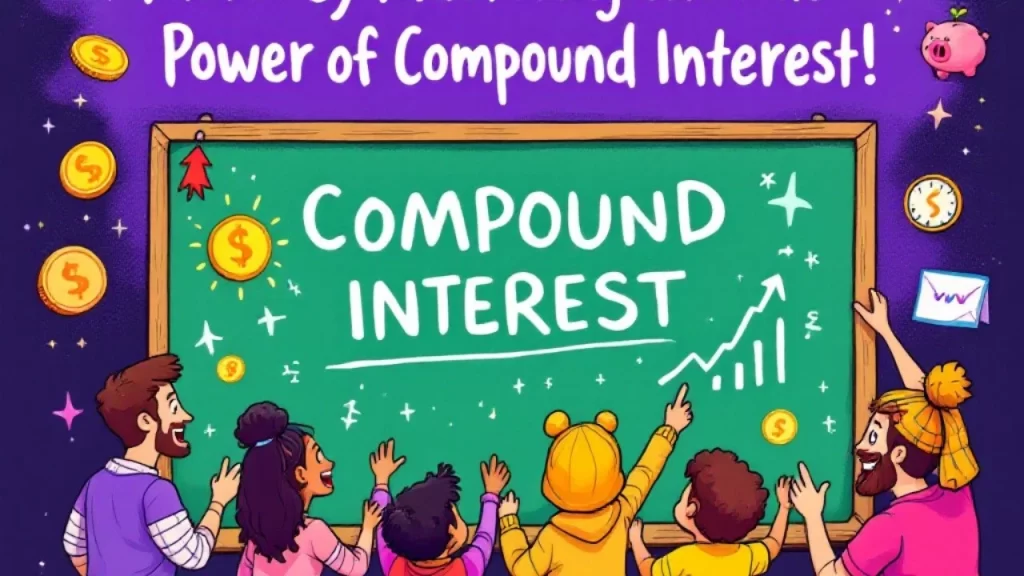Financial success doesn’t come overnight—but if there’s one principle that quietly works day and night to grow your wealth, it’s compound interest. It’s the secret engine behind every millionaire’s portfolio, yet often misunderstood or underestimated.
In this guide, you’ll learn how to harness compound interest to accelerate your wealth. We’ll break it down in simple terms, explore actionable strategies, and show how smart decisions today create powerful returns tomorrow.
What Is Compound Interest and Why It’s a Game Changer
Compound interest means earning interest on your original investment and also on the interest that it accumulates over time. Unlike simple interest, which pays only on the principal, compound interest creates a snowball effect—your money grows faster the longer you leave it.
The Wealth-Generating Formula
Here’s the basic compound interest formula:
A = P(1 + r/n) ^ nt
Where:
- A = future value of investment
- P = principal amount
- r = annual interest rate
- n = number of times interest applied per year
- t = time in years
It’s not about how much you invest—it’s about how long you let it grow.
Why Time Is Your Greatest Asset
The earlier you start, the more you gain. Even small contributions grow significantly when given time.
Example: If you invest $5,000 at an 8% annual return at age 25 and let it sit until 65, you’ll have over $117,000. If you wait until 35 to start, you’ll end up with just about $54,000.
The takeaway: Time trumps the amount invested. Start early, stay consistent.
Compound Interest Works Best with Consistency
You don’t need a windfall. What you need is consistent investing, even if it’s just a small amount monthly.
Consider:
- Setting up automated deposits into a high-yield savings account or investment platform.
- Investing in low-cost index funds with compounding growth.
When you combine regular contributions with compound growth, your wealth builds momentum.
The Best Accounts to Leverage Compound Growth
To maximize the power of compound interest, you need the right financial vehicles. Here are some of the best options:
High-Yield Savings Accounts
These accounts offer better interest rates than traditional savings accounts. Great for emergency funds.
Roth and Traditional IRAs
Tax-advantaged retirement accounts where your earnings compound tax-free or tax-deferred.
401(k) Plans
Employer-sponsored retirement accounts that often include matching contributions—free money that compounds.
Index Funds and ETFs
These investment tools track the market and compound returns over time with low fees.
Dividend Reinvestment Plans (DRIPs)
These allow you to reinvest dividends to buy more shares and grow your returns faster.
How to Maximize Your Compound Growth
Building wealth through compound interest isn’t automatic. Here’s how to make the most of it:
Reinvest Earnings
Instead of cashing out interest or dividends, reinvest them. This fuels exponential growth.
Avoid Unnecessary Withdrawals
Every time you take money out, you interrupt the compounding process. Think long-term.
Increase Contributions Over Time
As your income grows, increase your monthly contributions. Even small bumps can drastically change your financial outcome.
Minimize Fees and Taxes
Choose investments with low management fees and understand tax implications. Fees eat into your compounding engine.
The Psychology Behind Compound Success
Understanding numbers is easy. But financial discipline and mindset are what separate successful investors from the rest.
Patience is Power
Compound interest rewards those who wait. Don’t get distracted by market noise or short-term trends.
Consistency Beats Perfection
You don’t need perfect timing. You need steady habits. A monthly investment strategy works better than trying to predict the market.
Financial Literacy Leads to Confidence
When you understand how compounding works, you make smarter choices. Keep learning, and your wealth will follow.
Common Mistakes That Kill Compounding Potential
Even the best investment can underperform if you fall into these traps:
Delaying Investing
Waiting “until I earn more” wastes valuable time that could compound.
Withdrawing Too Often
Frequent withdrawals reset your progress.
Falling for High-Fee Products
Some financial products eat your gains with hidden fees. Always compare options.
Focusing Only on Returns
A higher return doesn’t always mean better growth if it comes with more risk or volatility.
Real-Life Success Stories
Many of today’s millionaires didn’t inherit wealth—they grew it using compound interest.
- Warren Buffett started investing at age 11. Most of his net worth was built after age 50—thanks to compounding.
- Everyday investors who started with $100/month into index funds saw six-figure gains over time.
Lesson: You don’t need luck. You need time, strategy, and consistency.
Tools to Track Your Compound Growth
Use these tools to project and manage your compound interest growth:
- Compound Interest Calculators – Investor.gov
- Robo-Advisors – Platforms like Betterment and Wealthfront help automate compound investing.
- Budgeting Apps – Tools like YNAB and Mint keep your finances aligned for consistent investing.
FAQs About Building Wealth with Compound Interest
What’s the ideal age to start investing with compound interest? The sooner, the better. Even small investments made in your 20s can outperform large ones made later.
Can compound interest help with short-term goals? Compound interest is best for long-term goals. For short-term savings, look for high-yield savings accounts.
How often should I reinvest my earnings? Always, if possible. Automatic reinvestment ensures uninterrupted compounding.
Is compound interest safe during market downturns? Compound interest doesn’t protect against losses, but long-term investing can smooth out volatility.
Do I need a financial advisor to get started? Not necessarily. Many platforms offer automated investing. However, a trusted advisor can help you create a tailored strategy.
Final Thoughts: Let Compound Interest Work for You
You don’t need to be rich to get rich. You need to start, stay committed, and let time and consistency do their job.
Compound interest rewards patience, discipline, and financial literacy. The earlier you embrace its power, the sooner you’ll experience the freedom that comes with true wealth.
So start today. Your future self will thank you.
Internal Links:
External Links:





